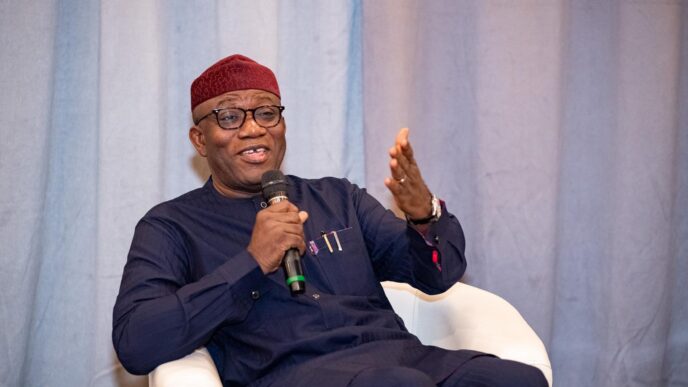Microphone and mixer at the radio station studio broadcasting news
BY FOLA FOLAYAN
In an era where digital media is reshaping how audiences consume information, radio remains a powerful force in Nigeria.
Despite the rapid growth of podcasts, social media influencers, and on-demand content, radio continues to be the most accessible medium, especially for lower-income and grassroots communities.
Yet, the industry faces pressing challenges—financial struggles, a lack of professional training, and an urgent need for new business models.
Advertisement
Crisis of sustainability in Nigerian radio
For many years, radio has been Nigeria’s primary source of news and entertainment. However, the industry is struggling to stay afloat.
One of the biggest problems radio stations in Nigeria face is financing. Many stations struggle to cover basic costs like electricity, maintenance, and staff salaries. At one point, most stations operated 24 hours a day, but now, some can barely stay on air for 12 hours.
Advertisement
The over-reliance on radio stations’ advertising revenue is a major issue. Many station owners focus solely on traditional ads, even as the global advertising market shrinks.
In the face of the current economic climate, radio stations must explore alternative revenue streams, including grants, fellowships, and content production funding. It’s no longer sustainable to rely on advertising alone, especially if you’re not a major media company.
Radio stations need to start seeing themselves as social enterprises. This shift will help them access funding opportunities that can support staff salaries, content development, and overall sustainability.
Beyond financial challenges, Nigerian radio is also grappling with a decline in content quality. Many broadcasters lack the time and resources to properly research and prepare their shows. What is obvious is that young broadcasters do have skills— but they don’t have resources.
Advertisement
Many work five to six-hour shifts daily with no time to research or script their shows properly. On top of that, most radio stations don’t hire producers, so broadcasters have to do everything themselves—booking guests, scripting, and managing production. This leads to shallow conversations and over-reliance on social media for content.
This trend has led to a reactive style of broadcasting, where hosts throw topics to listeners without providing any meaningful analysis. Many radio discussions today are just reactions—there’s barely any in-depth argument or proper context. If radio is going to remain relevant, stations must invest in research and content development.
While digital platforms have introduced new competition for audience attention, they also offer opportunities for radio to evolve. People now get their news from social media, influencers, and online platforms, but this doesn’t mean radio is dying. Instead, radio should embrace digital media.
Many stations now live-stream their programs on social media, and some are repurposing their shows into podcasts. This is a great move because it allows audiences to access content on demand and creates new revenue models.
Advertisement
Digital transformation should be seen as a way to expand radio’s reach, not as a threat. The future of radio is hybrid—on-air and online. Stations that successfully integrate digital strategies will remain relevant and financially viable.
Evolve or get left behind
Advertisement
For aspiring broadcasters, they have to get trained and keep learning. The general trend is that most radio stations don’t invest in staff training, therefore, young broadcasters have to take the initiative.
There are free virtual courses, journalism fellowships, and networking events—go for them. Don’t limit yourself to just radio. Expand your skills in journalism, digital content, and storytelling.
Advertisement
With emerging challenges, building a diverse skill set by broadcasters is a necessity. Some nine years ago, if someone had told me I wouldn’t be actively on air but still working in journalism, I might not have believed it. But today, I’m still deeply involved in the industry.
That’s the kind of future young broadcasters should aim for—one that is dynamic and adaptable. What is important for young broadcasters is to be proactive, network, and never stop learning.
Advertisement
They don’t have to wait for opportunities but create them as the media industry is changing fast, and only those willing to evolve will thrive.
Fola Folayan, a media entrepreneur, communications specialist, and broadcast trainer, writes from Kigali, Rwanda.
Views expressed by contributors are strictly personal and not of TheCable.
Add a comment










